Mississippi Today
How Dr. Scott Benton’s decisions tore these families apart
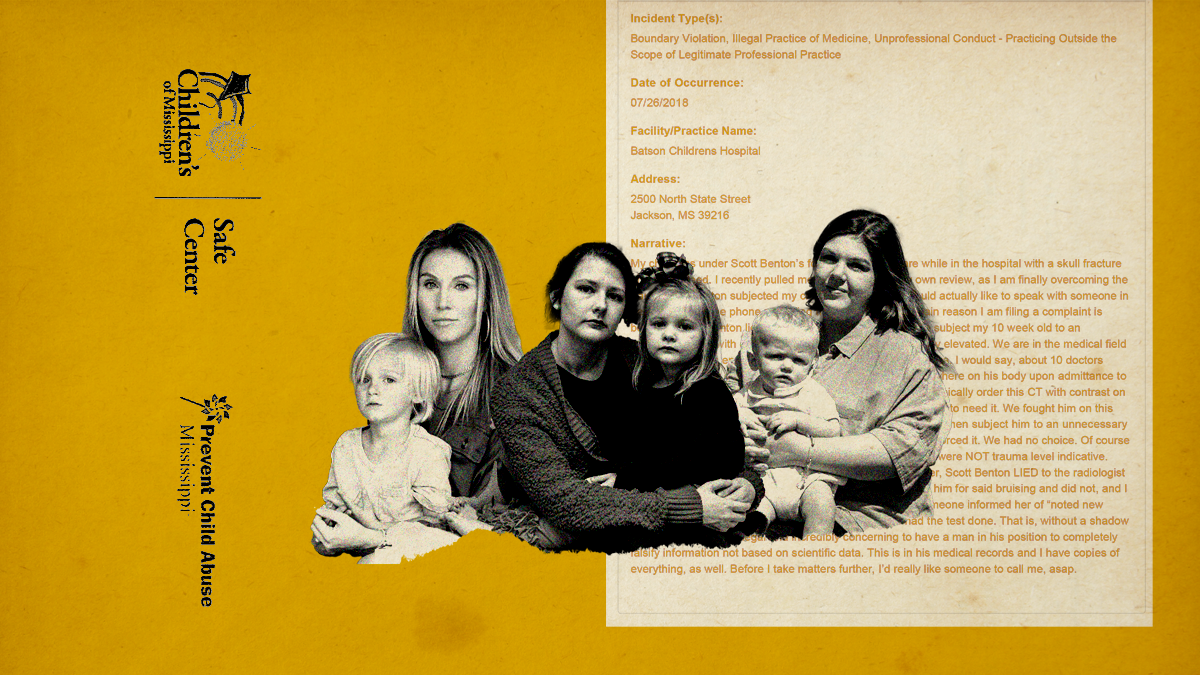
How Dr. Scott Benton’s decisions tore these families apart
This story is the third part in Mississippi Today’s “Shaky Science, Fractured Families” investigation about the state’s only child abuse pediatrician crossing the line from medicine into law enforcement and how his decisions can tear families apart.Read the full series here.
Caryn Jordan, Columbia
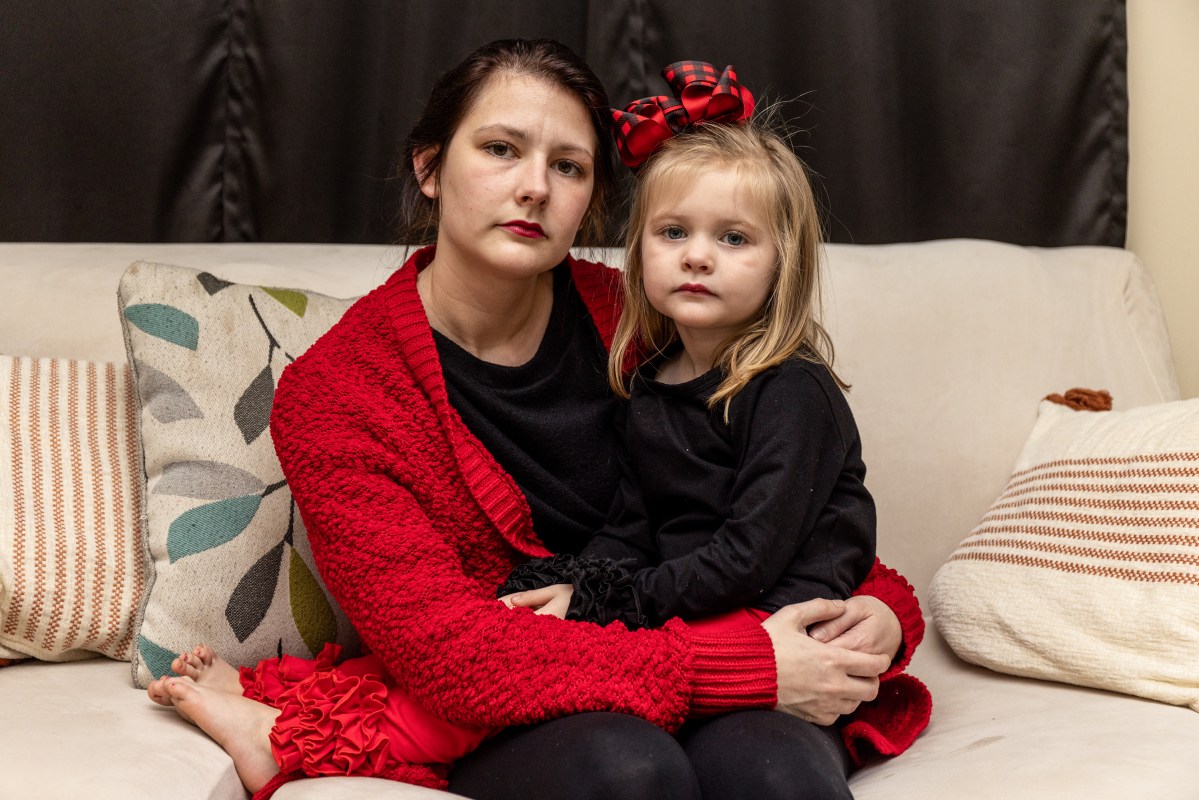
When Caryn Jordan took her 10-month-old daughter to Forrest General Hospital on March 29, 2020, she never imagined the state would take her child from her.
She said she also never considered that a pediatrician who would accuse her of child abuse wouldn’t do the necessary testing to determine if a genetic disease caused her daughter’s fractures.
The nightmare started when Jordan was putting her daughter Sawyer in her high chair. She noticed one leg was warm and swollen. She tried to get Sawyer to stand up, but the child couldn’t handle pressure being applied to the swollen leg.
At Forrest General Hospital, Jordan said doctors told her an X-ray revealed a fracture on Sawyer’s leg and that the hospital would have to transfer Sawyer to the University of Mississippi Medical Center (UMMC) in Jackson because they were not equipped to put a cast on an infant. The hospital had contacted Child Protective Services, she said she later realized.
An official with Forrest General Hospital said when there is suspected abuse or neglect, the hospital social worker is consulted and further screening is done.
“CPS is notified when circumstances warrant,” said Suzanne Wilson, the director of emergency services and transfer center at the hospital.
Wilson said not all suspected abuse cases are transferred out of the facility, but those requiring a specialist’s care are transferred, as well as those in need of pediatric services not provided at the hospital.
After performing a full body X-ray on Sawyer at UMMC, doctors told Jordan her daughter had a broken leg and 11 fractures across her body in various stages of healing.
Jordan was baffled. Sawyer had rarely left their home, aside from frequent doctor visits due to stomach issues and a salmonella infection. Her mind raced for answers.
Then Jordan got a call from Dr. Scott Benton, a pediatrician at UMMC who specializes in child abuse pediatrics. He told her that Sawyer looked like she had been thrown against a wall or in a car accident, she said. Another mother told Mississippi Today that Benton also accused her of throwing her baby against the wall.
“He spoke to me like I was this abusive, disgusting mother,” Jordan said. “I don’t think I’ve ever been that angry.”
Benton, who Jordan said she never saw in person, determined abuse caused her injuries. Jordan said to her knowledge, Benton, who told her on the phone he was out of town at the time, never saw Sawyer in person.
Jordan would not be taking Sawyer home. She was told to leave the hospital, and Sawyer went into the custody of Child Protective Services.
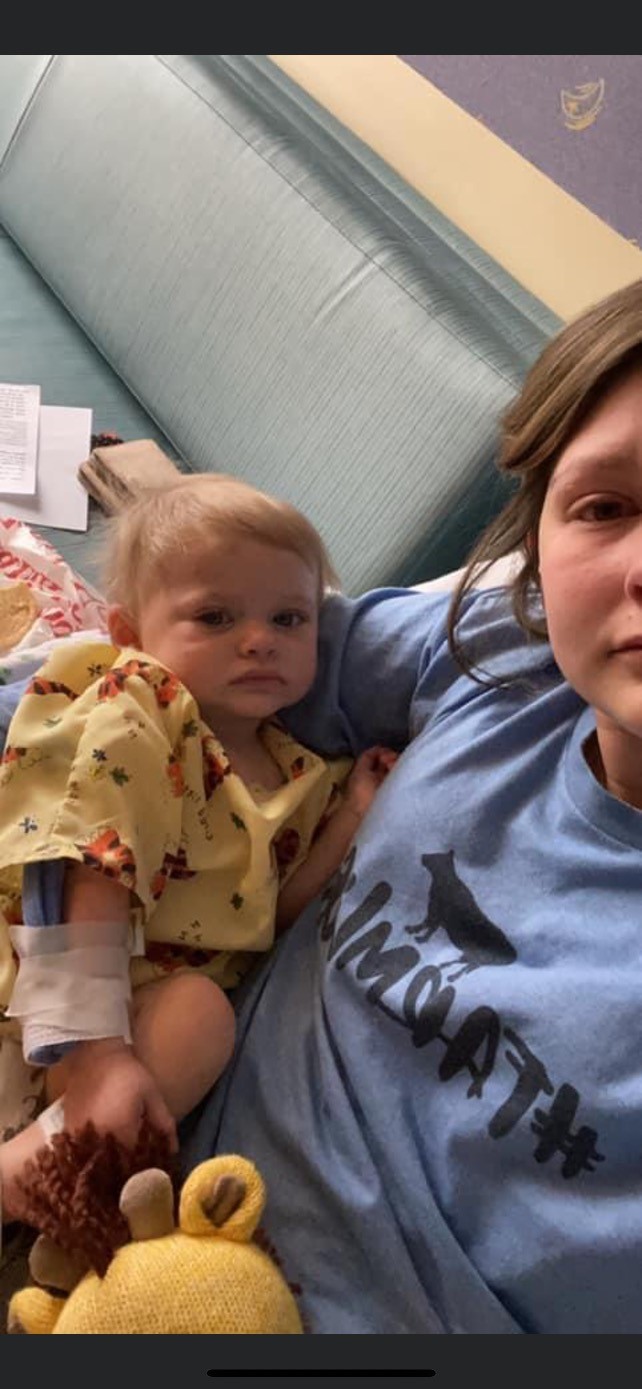
Back home in Columbia, Jordan turned all of her energy into getting Sawyer back, a fight that cost her everything. She was only able to work part time due to frequent court dates and doctor’s visits. She drained her savings and lost her health insurance. Her relationship with her boyfriend imploded. She moved back in with her parents.
“Could the fractures have occurred during birth?” she wondered. At one point, Sawyer got stuck in the birth canal. She had to be pushed back inside and delivered through an emergency cesarean section, Jordan said.
“Might Sawyer have a brittle bone disease called osteogenesis imperfecta?” Jordan thought. The group of inherited genetic disorders affects how the body makes collagen and causes fragile bones. A Facebook group she joined for parents whose children had the disorder encouraged her to request a bone density test.
But when Jordan proposed the idea, Benton replied in text messages that she shared with Mississippi Today: “There is no validated and approved bone density test for infants.”
While bone density tests are not typically performed on infants, there are alternative methods, Jordan said a pediatrician at Children’s Hospital New Orleans told her in June 2020. They include a skin biopsy or genetic testing to look for anomalies in certain genes involved in encoding collagen.
In videos shared with Mississippi Today, the New Orleans doctor tells Jordan that Sawyer’s symptoms and injuries are consistent with what is seen in a child with brittle bone disease, and that often the fractures are painless and left undiscovered for some time.
But Jordan was unaware Benton had performed a genetic osteogenesis imperfecta panel test on Sawyer on March 31, nor was she given the results. That test detected a variant of uncertain significance in her COL1A1 gene, which is involved in collagen production, according to Sawyer’s medical records from UMMC.
Dr. Mahim Jain, director of the Osteogenesis Imperfecta Clinic at Kennedy Krieger Institute and an assistant professor in the Department of Pediatrics at Johns Hopkins University School of Medicine, said issues with the COL1A1 gene are a major cause of OI.
“A variant of uncertain significance doesn’t really say, ‘Yes, it is disease causing’ or ‘no, it’s not.’ It means that there’s more work to be done to try to sort out if it is causing the condition,” Jain told Mississippi Today.
Benton’s report on Sawyer’s genetic test recommends genetic counseling and targeted testing of her parents to better understand the implications of this variant, but no further testing was done and no explanation was given as to why, according to the medical records.
Jordan said she became aware of the test and its results only after her case was concluded.
Benton declined to answer questions about Jordan and her daughter’s case, even though Jordan submitted a form to UMMC authorizing hospital employees to discuss her daughter’s medical records with Mississippi Today.
Benton told a group of public defenders in a recorded presentation about sex crimes, however, that before he came to UMMC in 2008, parents and anyone who was suspected of being associated with a child’s injury was “kicked out of the hospital.”
He said he reversed that policy so he could be sure to get a full history from parents and not overlook any possible medical explanations for a child’s injuries.
“That was part of their protocol (at the time). And I said ‘Alright, who am I supposed to get the history from? Who am I supposed to (talk to) to figure out if there’s a medical explanation for some of these bleeding findings?’” he told the group. “So we quickly reversed that.”
For the first three months while Sawyer was with a foster family, Jordan said she wasn’t allowed to see her, despite CPS visitation policy that states contact between the child and his or her parents must be arranged within 72 hours of that child being placed into foster care.
Shannon Warnock, a spokeswoman for CPS, said the agency can’t comment on specific cases, “including any exceptional circumstances that warrant policy adjustments.”
In December 2020, nine months after Jordan went into CPS custody, Jordan’s parents got a foster care license and got custody of Sawyer.
In doing so, that meant Jordan had to move out. She found a one-bedroom apartment she could afford.
Ultimately, the youth court judge concluded Sawyer was abused but it was unclear who inflicted the injuries, so she was returned to Jordan on April 5, 2021.
In the aftermath, Jordan has been diagnosed with post-traumatic stress disorder, an anxiety disorder and depression. She mourns the milestones she missed during the 15 months Sawyer was taken from her.
“I missed my daughter’s first birthday,” Jordan said. “I missed her first Easter. I missed her first step. I missed a lot of firsts. And these are things I can never get back.”
The separation also affected Sawyer, now an outspoken 3-year-old who sometimes rolls her eyes at her mother and loves to dance.
Sawyer has to carry KeKe, a fuzzy blanket covered in llamas, with her wherever she goes, Jordan said. The baby blanket was the only one of her belongings she was able to keep while in state custody. She still has separation anxiety, and Jordan often has to reassure her she will not leave her again.
Jordan recently scheduled additional testing for Sawyer in New Orleans to confirm if she has the brittle bone disease. She said she waited because of the cost, and because for a long time, the idea of taking Sawyer to a doctor left her terrified.
The two now live in a two-bedroom house in Columbia with a large backyard. They’re trying to start over and create a new normal.
“Ever since they closed our case, I’ve just tried to be a mom,” Jordan said.
Lindsey Tedford, Tupelo
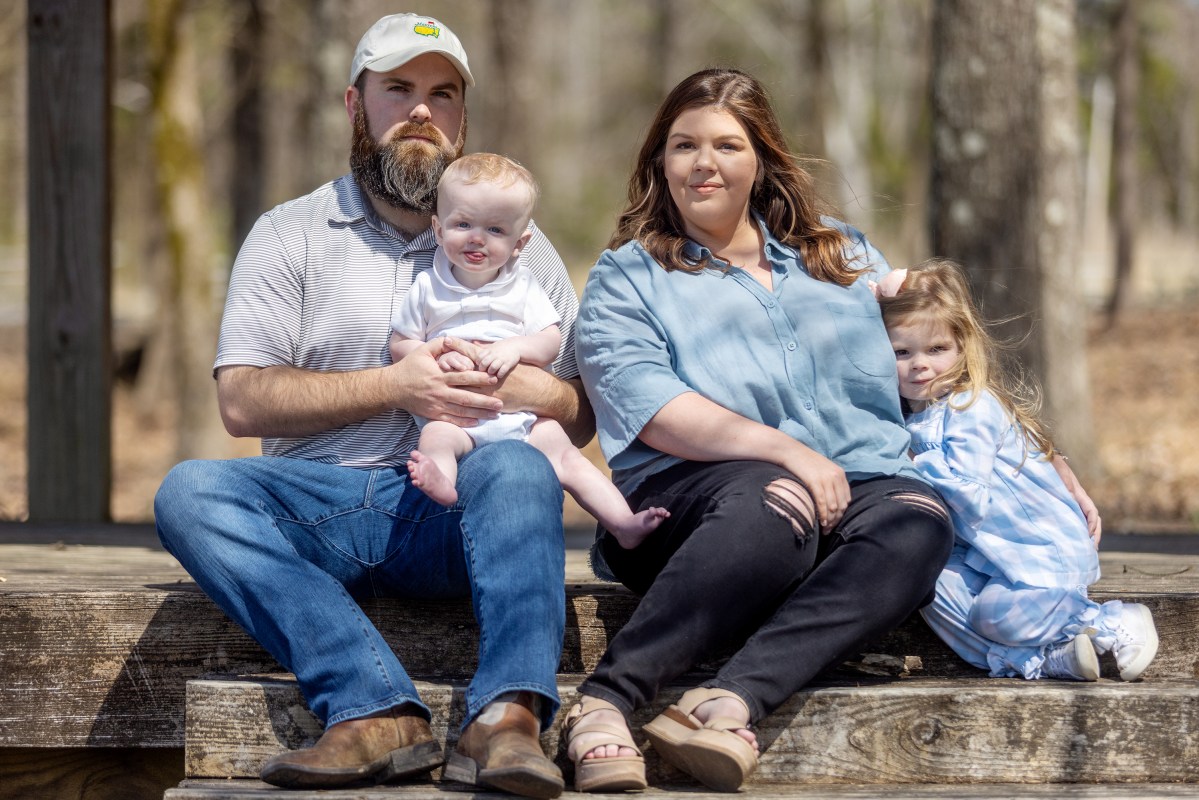
Lindsey Tedford of Tupelo rushed her 3-week-old son Cohen to the local emergency room at North Mississippi Medical Center on June 13, 2021. While her husband was holding their newborn and bent down to pick up a pacifier from the floor, Cohen had hit his head on the nearby crib, the parents told the nurses in the emergency room.
Cohen had bruising under both eyes and on his nose but was otherwise fine, the doctors told her.
The hospital never performed CT or MRI scans, medical records from the visit show.
But when Cohen was at a pediatric cardiologist appointment about two and a half months after the crib accident, the doctor noticed something concerning. Cohen’s head circumference had increased since his two-month checkup with his pediatrician. He scheduled an ultrasound two weeks later, and the results were “concerning for a brain bleed,” according to the baby’s medical records.
The doctor sent them to the North Mississippi Medical Center for a CT scan. It confirmed the ultrasound results: Blood had collected between the skull and the surface of the brain, and Cohen had a possible skull fracture.
The results triggered a chain of events that led to the Tedfords losing custody of Cohen for nearly five months. The state’s only child abuse pediatrician, Dr. Scott Benton, accused them of child abuse and diagnosed Cohen with “nonaccidental trauma.”
In recent months, doctors at Le Bonheur Children’s Hospital in Memphis have diagnosed Cohen, now over a year old, with a bleeding disorder called idiopathic thrombocytopenic purpura, or ITP. Subdural hematomas and intracranial hemorrhage — both diagnoses Cohen received at UMMC — are rare complications of ITP.
Back in September of 2021, the North Mississippi neurosurgeon recommended operating on the brain bleed as soon as possible. Lindsey asked the doctor to transfer Cohen to Le Bonheur in Memphis and left the hospital to go home to get clothes for the trip. On her way back, she got a frantic call from her husband Blake: they had taken Cohen in a helicopter, and he didn’t know where they were taking him, she said.
“As soon as Blake left to go out of the room to follow the people taking Cohen to the helicopter, (people from Child Protective Services) were waiting on him to question him.”
Eventually a nurse manager told him Cohen was sent to the University of Mississippi Medical Center in Jackson, she said.
A spokeswoman for North Mississippi Medical Center said the hospital aims to care for potential victims of child abuse “with love and respect.”
“We report child abuse to Child Protective Services in accordance with Mississippi regulations and treat as medically appropriate,” the spokeswoman said when asked how the hospital handles cases of suspected abuse and neglect. “UMMC maintains a Pediatric Sub-Specialty Clinic in Tupelo, which offers non-traumatic medical examinations and treatment for cases of suspected abuse and neglect.”

The Tedfords said they made phone calls to UMMC as they drove to Jackson. They eventually found Cohen in the emergency room.
They didn’t hear from Child Protective Services again until almost two weeks later — the day before Cohen was discharged into CPS custody.
CPS policy and state law do not require parents be informed they are being investigated for possible child abuse in any specific time frame.
“The Foster Care Policy manual does say that a parent ‘will be notified prior to, or as soon as safely possible, that his/her child is being placed in custody,’ but there is no specific time period for notifying the parent of the child’s removal,” said Shannon Warnock, a spokesperson for CPS.
She said the agency could not comment on specific cases.
Following more tests, Cohen was transferred to the pediatric intensive care unit. Neurology, hematology and ophthalmology consulted on his case.
Blood work revealed he was anemic, but medical records note a hematologist “… felt that anemia was most likely secondary to subdural hematoma.”
No other tests or scans were abnormal, according to the records.
About five days into Cohen’s hospital stay, Dr. Scott Benton introduced himself to her and her husband as the “staff forensic pediatrician,” Lindsey said.
“I didn’t know what that meant,” she said. “He said, ‘I’m going to record this session,’ and didn’t tell us a whole lot, just started asking questions.”
The couple relayed how Cohen had hit his head on his crib at 3 weeks old. Benton said the bleeding couldn’t have been caused by that, Lindsey said.
When she showed him pictures of Cohen’s bruised face and the bassinet, he said that didn’t “impress” him, she recalled.
Lindsey also told Benton about Cohen’s “traumatic” birth, but she said he told her the same — it didn’t impress him. During 17 hours of labor, both her and his heart rates dropped on several occasions, and she lost consciousness.
Cohen was born with the umbilical cord wrapped around his neck.
Benton declined to answer questions about Lindsey and her son’s case, even though she submitted a form to UMMC authorizing hospital employees to discuss her son’s medical records with Mississippi Today.
Lindsey attempted to get the recording of her conversations with Benton from the Children’s Safe Center, the medical center Benton oversees, but was unable to reach an employee, she said. Another mother who attempted to get similar recordings was told she must have an attorney to do so.
At UMMC, a surgeon drilled small openings called burr holes into Cohen’s skull to relieve pressure from the bleeding. He recovered and was discharged from UMMC.
The Tedfords appealed to a CPS case worker to allow Cohen to stay with Blake’s mother, who lived about 20 minutes from their home. CPS tentatively agreed, pending a successful home visit.
On Sept. 22, 2021, officials from Child Protective Services took the baby back to Tupelo. The hospital had diagnosed his injury as “nonaccidental trauma to child.”
For months, the Tedfords’ lives were divided between two houses. CPS had also removed their then-3-year-old daughter Cullen Claire from the home under a safety plan, and she was staying with Lindsey’s parents.
“She kept asking, ‘Why can’t I go home with my mommy and daddy? Is my brother ever going to get better?’ We couldn’t tell her, ‘You can’t come home because these people think we’re abusing you,’” said Lindsey.
Cohen wasn’t sleeping well away from his home, either, and his grandmother was in a state of constant exhaustion.
Over the next several months, CPS visited the Tedfords’ home, and the couple took (and passed) a polygraph test at the end of October, Lindsey said.
At a December safety plan review, Cullen Claire’s court-appointed guardian recommended returning her home because of the detrimental impact on her mental health — contingent on Lindsey receiving a mental evaluation because of the postpartum depression she revealed to Benton at the hospital in their conversation.
Several court dates for Cohen in early January passed with no action from CPS or the prosecution. They finally went back to court at the end of January.
“Our lawyer presented dismissal, saying there was basically not enough evidence to say these people abused their children,” recalled Lindsey. “He said, ‘This has been going on for five months now, nothing’s happened, we haven’t been to trial, and we just now got medical records. How long is this going to go on, and this family is broken?’”
When the judge asked the prosecution if they would be ready for trial in the next month, the attorneys said no.
Cohen’s court-appointed guardian also recommended the child return home. The judge ruled in the Tedfords’ favor, but stated Cohen should remain under a CPS safety plan involving periodic home visits. The plan ended March 2, 2022.
Life for the Tedfords is, on the outside, back to normal. But a lot has changed.
In addition to the health scare with Cohen and frequent trips to Memphis for his doctor appointments for ITP, his sister Cullen Claire, now 4, is struggling.
“We’re looking into child therapy for her. She tells us all the time that she doesn’t think we love her, that no one likes her. She’s struggled at school,” Lindsey said, starting to cry. “It’s definitely caused a lot of trauma.”
Lindsey has also been to therapy to work through what happened.
She said any time there’s a minor accident — bumps, falls and scrapes — she gets worried.
“What would it take for my kids to go back into CPS custody?” she wonders.
Lauren Ayers, Madison
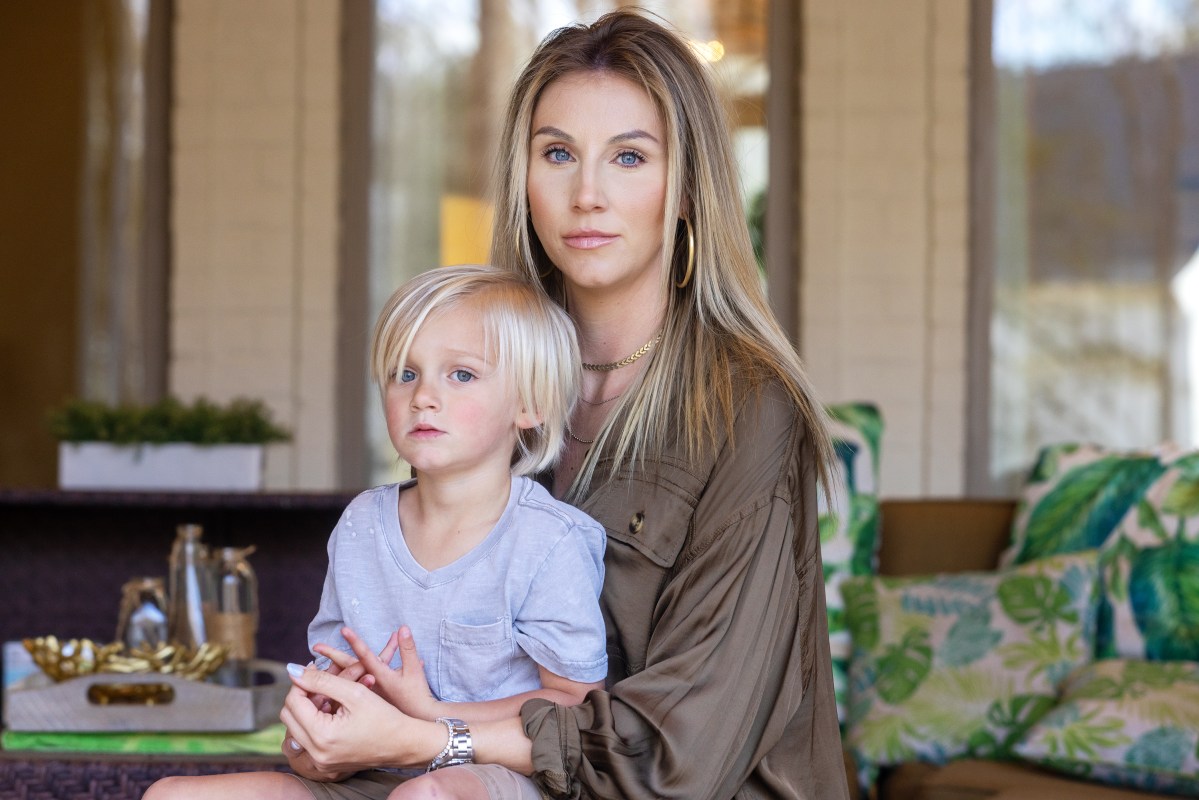
After an afternoon at the playground on July 24, 2018, Lauren Ayers of Madison came home with her 10-week-old twins and almost 2-year-old son.
Ayers’ husband was in Oklahoma for work, so she was left alone with the three boys. She made spaghetti for her older son and herself. After they ate, she started the bedtime routine for the twins, Eli and Conner. She changed Conner’s diaper, swaddled him and laid him in his bassinet in her bedroom.
She put the other twin, Eli, on the plastic diaper changing pad on top of the dresser where she changes the boys’ diapers in their nursery. She had Eli’s onesie undone, so the lower half of his body was pressed directly against the uncovered pad.
The three children’s screams and cries created a cacophony in her home. Eli was kicking and thrashing on the changing pad.
Over the sound of the cries, she heard a clicking noise behind her and turned around, with Eli still on the changing table. Her older son sometimes liked to stand on the glider and rock back and forth, and she’d often have to intercept him before he fell. This time, though, he was playing with a retractable tape measure.
Turning back around, she was horrified to see Eli had scooted himself backwards and had fallen, landing on the crown of his head on the hard floor.
She remembers the resounding thud. When she ran over to pick him up, he was crying, but then became limp and lost consciousness.
“I thought he had broken his neck … I couldn’t find my phone, I was running outside and screaming for anybody to help me,” Ayers recalled. “I finally remembered where my phone was and ran in and called 911. He was unconscious, but he was breathing.”
Ayers’ neighborhood in Flora was new at the time, and she said she was either so upset she wasn’t being clear about where she lived or the emergency response officials weren’t sure where she was. She offered to meet them at Mannsdale Upper Elementary School, about a mile from her house.
“I loaded everybody up, got there … three different fire departments came,” she said. “I kept asking this off-duty firefighter … ‘What do we need to do?’ And he said, ‘Look, if anything’s wrong with him, you want him in the care of an ambulance.’”
With Ayers’ husband out of town and her family in Destin, her best friend came to the school along with her husband.
When no ambulance had arrived 30 minutes later, “the off-duty firefighter was like, ‘You’ve got to get him to a hospital,’” she said. “So my best friend’s husband drove us (to the University of Mississippi Medical Center).”
Ayers’ friend stayed with her and Eli, who had regained consciousness, when he arrived in the emergency room.Two of Ayers’ other friends were also in the emergency room with them, along with her in-laws.

“Thank God people could come back in the ER (because) they were witnesses of everything that happened … They tried to get an IV in him … They stuck him probably over 12 times,” Ayers described. “They couldn’t get blood from him.”
The nurses started a procedure called “milking,” said Ayers, where they would put both hands on Eli’s legs and arms and squeeze the skin in opposite directions in an attempt to get blood to flow.
They checked his stats, ran tests and admitted him to the pediatric intensive care unit for the night. A neurosurgeon reassured Ayers and her family that while the injury was bad, Eli would recover.
A scan the next morning showed Eli’s brain bleed had not gotten any larger, so he was moved to a regular room. That day, Ayers said the nurse told her the forensic pediatrician wanted to go over what happened. Ayers had no idea what a forensic pediatrician was.
Ayers attempted to get a recording of her conversation with Benton to share with Mississippi Today, but was told by the Children’s Safe Center, the medical center Benton oversees, that she would have to get an attorney to obtain it.
But she well remembers how the conversation began.
“He goes on to explain his (Eli’s) injuries and then asked if I remembered (the actress) Natasha Richardson. And I was like ‘Yea, yea, from the ‘Parent Trap’,’” she said. “And he goes, you know, ‘she had the skiing accident … This is the same injury your child has.’”
Richardson suffered a head injury and died two days later in 2009.
Ayers was shocked. She thought maybe Benton was about to tell her something was very wrong.
Benton abruptly closed his notebook and looked at her, she said.
“He said, ‘You’re under a lot of pressure right now. You have three kids, you were home alone — postpartum (depression) is a real thing,’” she remembered. “‘Tell me what really happened.”
Benton’s notes from Eli’s medical records show his certainty that the baby was not injured the way Ayers said.
“The fractures are discontinuous (do not connect) and appear to represent separate impact sites,” his notes show. “… Bilateral fractures are not reported in single fall incidents except where the skull fractures are continuous across sutures or in cases of bilateral out bending from a posterior impact causing symmetrical fractures.”
He goes on to note his concerns are whether Eli was developmentally able to kick or slide himself backwards and whether his skull fractures are “consistent” with Ayers’ account of what happened.
An occupational therapist who later evaluated Eli noted he was “quite active for age and may be slightly ahead with developmental milestones.” Ayers also took a video of Eli scooting himself backwards off a diaper changing pad, which she provided to Mississippi Today. In the video, he is wearing the same onesie outfit he was wearing in photos from the hospital.
She said Benton then told her he believes she threw the baby against a wall.
Yet the “most traumatizing part” of the first meeting with Benton, she said, was when he “strips that baby naked, and he’s looking, I guess, for signs of abuse.”
He started taking pictures of the bruises and needle marks from when Eli was admitted in the ER. Ayers asked what he was doing, and he said he believed she had inflicted the bruises.
He argued with her that the bruises were not from attempts to draw blood, and that “milking” was against hospital policy.

“I kept saying, ‘Don’t you see the needle marks?’ I was screaming at the nurses, ‘These are needle marks, you see them and you gave them to him!’” said Ayers.
Her friend had written down the names of the nurses who treated Eli in the emergency room, and Ayers begged Benton to talk to them. Ayers found a nurse who showed Benton records that when Eli first came to the hospital, no bruising or marks were noted.
A pediatric general surgeon who reviewed Eli two days later noted “bruising to left hand with visible venous access attempt noted” and “IV to right foot.”
Benton backed off, she said. But Ayers’ anxiety had only increased.
“At that point I was like, ‘They’re going to take this baby from me,’” she said.
Benton declined to answer questions about Ayers and her son’s case, even though Ayers submitted a form to UMMC authorizing hospital employees to discuss Eli’s medical records with Mississippi Today.
At the next meeting with Benton, Ayers had family members with her, including her father-in-law, a pharmacist. One of Eli’s tests had come back showing he had slightly elevated liver enzymes, which Benton believed indicated trauma to the abdomen.
Ayers’ father-in-law asked to review the test results.
“He (my father-in-law) literally looked at him and said, ‘Dr. Benton, with all due respect, these are stress-related elevated enzymes,’” she recalled. “‘These are not trauma-level numbers.’”
Benton said Eli would need to do a CT with contrast that requires fasting and radiation. Radiation exposure is particularly concerning in children because they are more sensitive to radiation. And because they have a longer life expectancy than adults, that results in a larger window of opportunity for them to experience radiation damage.
Ayers and her father-in-law objected to the CT, noting Ayers’ husband, Drew, had a kidney condition that made dehydration particularly dangerous, and there was a chance Eli might have the same issue.
But Benton insisted, and they relented.
In the paperwork under “clinical history” for the CT scan, it states: “Reported new bruising on the abdomen. Concern for blunt trauma to abdomen.” There had never been any mention of abdominal bruising in the medical records or to Ayers up until that point, and the CT was performed two days after Eli came to the hospital.
The scan came back normal.
“No evidence of blunt trauma to the abdomen. No acute fractures or dislocations,” the report stated.
Eli was discharged but subjected to another full body X-ray several weeks after he left, according to records. A case worker from Child Protective Services visited Ayers’ home and cleared Eli to return. Several weeks later, a Madison County sheriff’s investigator also interviewed Ayers.
The case was closed that day, the incident report stated.
What haunts Ayers even four years later is wondering what happens to mothers without the resources she had: the ability to hire an attorney, a family member in the medical field to sit in on meetings with Benton and the support of friends and family who were in the emergency room and hospital with her.
“This man should have some more oversight … if you’re going to subject a 10-week-old to all these tests, two MRIs, a CT, X-rays, you should have your evidence in order,” said Ayers, who said she struggled “with some pretty dark days” after the accusations from Benton and the experience in the hospital.
Ayers filed a complaint with the Mississippi State Board of Medical Licensure in March of last year. In her complaint, she highlighted the unexplained “new bruising to abdomen” on the notes for his CT – bruising that was never mentioned anywhere else in his medical records.
“I would say, about 10 doctors signed off that my child (the patient) had ZERO bruising anywhere on his body upon admittance to the hospital … Scott Benton couldn’t ethically order this CT with contrast on my child bc (because) his liver enzymes weren’t actually elevated enough to need it,” she wrote. “ … Before I take matters further, I’d really like someone to call me, asap.”
She never heard anything back.
Editor’s note: Kate Royals, Mississippi Today’s community health editor since January 2022, worked as a writer/editor for UMMC’s Office of Communications from November 2018 through August 2020, writing press releases and features about the medical center’s schools of dentistry and nursing.
This article first appeared on Mississippi Today and is republished here under a Creative Commons license.
Did you miss our previous article…
https://www.biloxinewsevents.com/?p=210275
Mississippi Today
Pharmacy benefit manager reform likely dead
Hotly contested legislation that aimed to increase the transparency and regulation of pharmacy benefit managers appeared dead in the water Tuesday after a lawmaker challenged the bill for a rule violation.
The bill was sent back to conference after Rep. John Hines, D-Greenville, raised a point of order challenging the addition of code sections to the bill, which will likely kill it.
House members in the past have chosen to turn a blind eye to the rule, which would require the added code sections to be removed when the bill is returned to conference. This fatal flaw will make it difficult to revive the legislation.
“It will almost certainly die,” said House Speaker Jason White, who authored the legislation. “And you can celebrate that with your pharmacist when you see them.”
“…This wasn’t ‘gotcha.’ Everybody in this chamber knew that code sections were added, because the attempt was to make 1123 more suitable to all the parties.”
The bill sought to protect patients and independent pharmacists, who have warned that if legislators do not pass a law this year to regulate pharmacy benefit managers, which serve as middlemen in the pharmaceutical industry, some pharmacies may be forced to close. They say that the companies’ low payments and unfair business practices have left them struggling to break even.
The bill underwent several revisions in the House and Senate before reaching its most recent form, which independent pharmacists say has watered the bill down and will not offer them adequate protection.
House Bill 1123, authored by White, originally focused on the transparency of pharmacy benefit managers. The Senate then beefed up the bill by adding provisions barring the companies from steering patients to affiliate pharmacies and prohibiting spread pricing – the practice of paying insurers more for drugs than pharmacists in order to inflate pharmacy benefit managers’ profits.
Independent pharmacists, who have flocked to the Capitol to advocate for reform this session, widely supported the Senate’s version of the bill.
The Senate incorporated several recommendations from the House into its bill, saying that they believed that the legislation would have the House’s support.
Instead, the House sent the bill to conference and requested additional changes, including new language that would eliminate self-funded insurance plans, or health plans in which employers assume the financial risk of covering employees’ health care costs themselves, from a section of the bill that prohibits pharmacy benefit managers from steering patients to specific pharmacies.
This language seeks to satisfy employers, who argue that regulating pharmacy benefit managers’ business practices will lead to higher health insurance costs.
Sen. Rita Parks, R-Corinth, who has spearheaded pharmacy benefit manager reform efforts in the Senate, previously said that adding the language to the bill would “remove any protection out of the law.” But she signed the conference report that included the language Monday after a heated conference meeting between lawmakers.
Rep. Hank Zuber, R-Ocean Springs and co-author of the bill, said the bill has something for everybody, gesturing to its concessions for employers and independent pharmacists. He said the bill gives independent pharmacists 85% of what they wanted.
Mississippi Independent Pharmacies Association director Robert Dozier was not available for comment by the time the story published.
Zuber told House members Tuesday to “blame the Senate” for the slow progress of pharmacy benefit manager reform in Mississippi, citing the body’s failure to take up a drug pricing transparency bill half a decade ago, for three years in a row.
“If the Senate had followed the leadership and the legislation that we drafted those many years ago, we would not be here,” Zuber said. “We would have the information on drug pricing, we would have the information and transparency on (pharmacy benefit managers) and we would have the ultimate reason as to why drug costs continue to rise.”
Members of the House expressed dissatisfaction with the legislation Tuesday, arguing it did not do enough to ensure lower prescription drug costs for consumers.
“I’m going to try to do something next year that goes even further,” Zuber responded.
For the past several years, lawmakers have proposed bills to regulate pharmacy benefit managers, but none have made it as far as this session.
“We’ll go another year,” said White.
This article first appeared on Mississippi Today and is republished here under a Creative Commons license.![]()
Mississippi Today
Feuding GOP lawmakers prepare to leave Jackson without a budget, let governor force them back
After months of bitter Republican political infighting, the Legislature appears likely to end its session Wednesday without passing a $7 billion budget to fund state agencies, potentially threatening a government shutdown if they don’t come back and adopt one by June 30.
After the House adjourned Tuesday night, Speaker Jason White said he had presented the Senate with a final offer to extend the session, which would give the two chambers more time to negotiate a budget. As for now, the 100 or so bills that make up the state budget are dead.
The Senate leadership was expected to meet and consider the offer Tuesday evening, White said. But numerous senators both Republican and Democrat said they would oppose such a parliamentary resolution, and Lt. Gov. Delbert Hosemann has also said it’s unlikely and that the governor will have to force lawmakers back into special session.
White said he believes, if the Senate would agree to extend the session and restart negotiations, lawmakers could pass a budget and end the 2025 session by Sunday, only a few days later than planned.
But if the Senate chooses not to pass a resolution extending the session, White said the House would end the session on Wednesday.
It would take a two-thirds vote of support in both chambers to suspend the rules and extend the session. The Senate opposition appears to be enough to prevent that.
Still, the speaker said he believes Lt. Gov. Delbert Hosemann and Senate leaders are considering the proposal. But he said if he doesn’t hear a positive response by Wednesday, the House will adjourn and wait for Gov. Tate Reeves to call a special session at a later date.
“We are open to (extending the session), but we will not stay here until Sunday waiting around to see if they might do it,” White said.
White said leaving the Capitol without a budget and punting the issue to a special session might not cool tensions between the chambers, as some lawmakers hope.
“I think when you leave here and you end up in a special session, some folks say, ‘Well everybody that’s upset will cool down by then.’ They may, or it may get worse. It may shine a different and specific light on some of the things in this budget and the differences in the House and Senate,” White said. “Whereas, I think everybody now is in the legislative mode, and we might get there.”
The Mississippi Constitution does not grant the governor much power, but if Gov. Tate Reeves calls lawmakers into a special session, he gets to set the specific legislative agenda — not lawmakers.
White said the governor could potentially use his executive authority to direct lawmakers to take up other bills, such as those related to education, before getting to the budget.
“When we leave here without a budget, it is entirely the governor’s prerogative to when he (sets a special session) and how he does that.”
While the future of the state’s budget hangs in the balance, lawmakers have spent the remaining days of their regular session trying to pass the few remaining bills that remained alive on their calendars.
House approves DEI ban, Senate could follow suit on Wednesday
The House on Tuesday passed a proposal to ban diversity, equity and inclusion programs from public schools, and both chambers approved a measure to establish a form of early voting.
The House approved a conference report compromise to ban DEI programs and a list of “divisive concepts” from K-12 schools, community colleges and universities. If the Senate follows suit, Mississippi would join a number of other Republican-controlled states and President Donald Trump, who has made rooting DEI out of the federal government one of his top priorities.
The agreement between the Republican-dominated chambers follows hours of heated debate in which Democrats, all almost of whom are Black, excoriated the legislation as a setback in the long struggle to make Mississippi a fairer place for minorities. Legislative Republicans argued the legislation will elevate merit in education and remove from school settings “divisive concepts” that exacerbate divisions among different identity groups.
The concepts that will be rooted out from curricula include the idea that gender identity can be a “subjective sense of self, disconnected from biological reality.” The move reflects another effort to align with the Trump administration, which has declared via executive order that there are only two sexes.
The House and Senate disagreed on how to enforce the act, but ultimately settled on an agreement that would empower students, faculty members and contractors to sue schools for violating the law, but only after they go through an internal campus review process that would give schools time to make changes. The legislation could also withhold state funds from schools that don’t comply.
Legislature sends ‘early voting lite’ bill to governor
The Legislature also overwhelmingly passed a proposal to establish a watered down version of early voting, though the legislation is titled “in-person excused voting,” and not early voting.
The proposal establishes 22 days of in-person voting before Election Day that requires voters to go to the circuit clerk’s office or another location county officials have designated as a secure early voting facility, such as a courtroom or a board of supervisors meeting room.
To cast an early vote, someone must present a valid form of photo ID and list one of about 15 legal excuses to vote before Election Day. The excuses, however, are broad and would, in theory, allow many people to cast early ballots.
Examples of valid excuses are voters expecting to work on Election Day, being at least 65 years old, being currently enrolled in college or potentially travelling outside of their county on Election Day.
Since most eligible voters either work, go to college or are older than 65 years of age, these excuses would apply to almost everyone.
“Even though this isn’t early voting as we saw originally, it makes this more convenient for hard working Mississippians to go by their clerks’ office and vote in person after showing an ID 22 days prior to an election,” Senate Elections Chairman Jeremy England said.
Republican Gov. Tate Reeves opposes early voting, so it’s unclear if he would sign the measure into law or veto it.
Both chambers are expected to gavel at 10 a.m. on Wednesday to debate the final items on their agenda.
This article first appeared on Mississippi Today and is republished here under a Creative Commons license.
Mississippi Today
‘A lot of us are confused’: Lacking info, some Jacksonians go to wrong polling place
Johnny Byrd knew that when his south Jackson neighborhood Carriage Hills changed wards during redistricting last year, his neighbors would have trouble finding their correct polling place on Election Day.
So he bought a poster board and inscribed it with their new voting location – Christ Tabernacle Church.
“I made a sign and placed it in front of the entrance to our neighborhood that told them exactly where to go so there would be no confusion,” said Byrd, vice president of the Association of South Jackson Neighborhoods.
Still, on April 1, a car full of voters from a senior living facility who should have gone to Christ Tabernacle were driven to their old polling place.
“I thought it was unfortunate they had to get there and find out rather than knowing in advance that their polling location was different,” said Sen. Sollie Norwood, a Democrat from Jackson who was on the ground Tuesday helping constituents with voting.
One of those elderly women became frustrated and said she no longer wanted to vote, Norwood said, though her companions tried to convince her otherwise. By midday Tuesday, 300 people had voted at Christ Tabernacle, one of the city’s largest precincts currently in terms of registered voters, but among the lowest in turnout historically.
Voting rights advocates and candidates vying for municipal office in Jackson are keeping an eye on issues facing voters at the polls, though without official results, it remains to be seen if that will dampen turnout this election with the hotly contested Democratic primary.
“I still believed it was gonna be low,” Monica McInnis, a program manager for the nonprofit OneVoice, said of turnout. “I was expecting it would be a little higher because of what is on the ballot and how many people are running in all of the wards as well as the mayor’s race.”
The situation is evolving as the day goes on, but the main issues are twofold. One, thousands of Jackson voters have new precinct locations after redistricting last year put them into a new city council ward.
Two, some voters didn’t realize their polling place for the municipal elections may differ from where they voted in last year’s national elections, which are run by the counties.
In Mississippi, voters are assigned two precincts that are often but not always the same: A municipal location for city elections and a county location for senate, gubernatorial and presidential elections
“People in Mississippi, we go to the same polling location for three years, and that fourth year, it changes,” said Jada Barnes, an organizer with the Jackson-based nonprofit MS Votes. “A lot of us are confused. When people are going to the polling place today, they’re seeing it is closed, so they’re just going back home which is making turnout go even lower.”
Barnes said she’s hearing this primarily from a few Jackson voters who called a hotline that MS Votes is manning. Lack of awareness around polling locations is a big deterrent, she said, because most people are trying to squeeze their vote in between work, school or family responsibilities.
“Maybe you’re on your lunch break, you only got 30 minutes to go vote, you learn that your polling location has changed and now you have to go back to work,” she said.
Norwood said he heard from a group of students assigned to vote at Christ Tabernacle who had attempted to vote at the wrong precinct and were told their names weren’t on the rolls. They didn’t know they had been moved from Ward 4 to Ward 6, Norwood said, meaning they expected to vote in a different council race until reaching the polls Tuesday.
Though voters have a duty to be informed of their polling location, Barnes said city and circuit clerks and local election commissioners are ultimately responsible for making sure voters know where to go on Election Day.
Angela Harris, the Jackson municipal clerk, said her office worked to inform voters by mailing out thousands of letters to Jacksonians whose precincts changed, including the roughly 6,000 whose wards changed during the 2024 redistricting.
“I am over-swamped,” she said yesterday.
Despite her efforts, at least one voter said he never got a letter. Stephen Brown learned through Facebook, not an official notice, that he was moved from Ward 1 to Ward 2.

A resident of the Briarwood Heights neighborhood in northeast Jackson, Brown’s efforts to vote Tuesday have been complicated by mixed messages and a lack of communication. He has yet to vote, even though he showed up at the polls at 7:10 this morning.
His odyssey took him to two wrong locations, where the poll managers instructed Brown to call his ward’s election commissioner, who did not answer multiple calls, Brown said. Brown finally learned through a Facebook comment that he could look up his new precinct on the Mississippi Secretary of State’s website — if he scrolled down the page past his county precinct information.
This afternoon, Brown has a series of meetings planned, so now he’s hoping for a 30-minute window to try voting one more time, even though he’s skeptical it will make a difference.
“I’m a very disenchanted voter, because I’ve been let down so much,” he said. “I vote because it’s the thing that I’m supposed to do and because of the sacrifices of my ancestors, but not because I truly believe in it, you know?”
Brown’s not alone in facing turbulence. Back at Christ Tabernacle, one Jackson voter, who declined to give her name, said she’s frustrated from having to drive to three polling locations in one day.
“I’m dissatisfied with the fact that I had to drive from one end of this street and all of the back to come over here when I usually vote over here on Highway 18,” she said. “This was a great inconvenience, gas wise and time wise.”
The same thing happened to Rodney Miller. He called the confusion some voters are facing in this election “unnecessary.”
“That ain’t the way we should be handling business,” he said. “We should be looking out for one another better than that, you know? It’s already enough getting people out to vote, and when you confuse them when they try? Come on now. That’s discouraging.”
Christ Tabernacle is the second largest precinct in the city in terms of registered voters, with 3,330 assigned to vote there as of 2024, according to documents retrieved from the municipal election committee. But it had one of the lowest voter turnout rates – 10% in the 2021 primary election before redistricting and before it became so large.
Byrd mentioned the much higher turnout in places like Ward 1 in northeast Jackson, compared to where he lives in south Jackson. Why does Byrd think this is?
“Civics,” Byrd said. “They took civics out of school. If you ask the average person what is the role and responsibility of any elected official, they can’t tell you.”
This article first appeared on Mississippi Today and is republished here under a Creative Commons license.![]()
-

 News from the South - Florida News Feed7 days ago
News from the South - Florida News Feed7 days agoFamily mourns death of 10-year-old Xavier Williams
-

 News from the South - Alabama News Feed5 days ago
News from the South - Alabama News Feed5 days agoSevere storms will impact Alabama this weekend. Damaging winds, hail, and a tornado threat are al…
-

 News from the South - Alabama News Feed5 days ago
News from the South - Alabama News Feed5 days agoUniversity of Alabama student detained by ICE moved to Louisiana
-

 News from the South - Louisiana News Feed6 days ago
News from the South - Louisiana News Feed6 days agoSeafood testers find Shreveport restaurants deceiving customers with foreign shrimp
-

 News from the South - Oklahoma News Feed3 days ago
News from the South - Oklahoma News Feed3 days agoTornado watch, severe thunderstorm warnings issued for Oklahoma
-

 News from the South - Oklahoma News Feed7 days ago
News from the South - Oklahoma News Feed7 days agoWhy are Oklahomans smelling smoke Wednesday morning?
-

 News from the South - West Virginia News Feed6 days ago
News from the South - West Virginia News Feed6 days agoRoane County Schools installing security film on windows to protect students
-

 News from the South - Florida News Feed6 days ago
News from the South - Florida News Feed6 days agoPeanut farmer wants Florida water agency to swap forest land













































